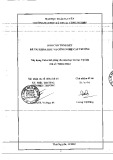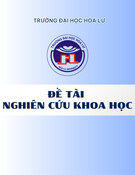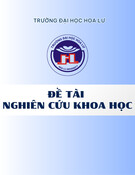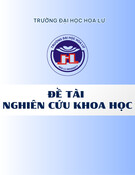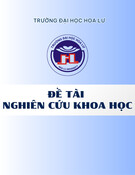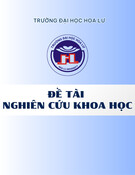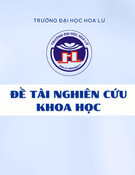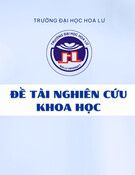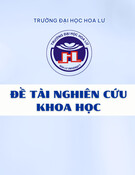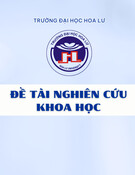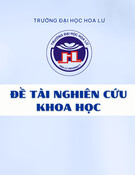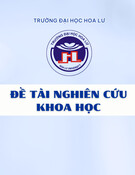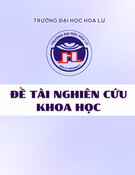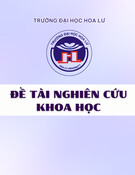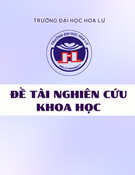
COM M E N TAR Y Open Access
Science that “knows”and science that “asks”
Pierre R Smeesters
1*
, Marie Deghorain
1
and Andrew C Steer
2
Abstract
Clinician-researchers and experimental scientists do not speak the same language; they have different professional
environments and different end-points in their research. This creates considerable problems of comprehension and
communication, which constitute a major drawback in multidisciplinary work such as translational medicine. A
stereotypic representation of both these worlds is presented as a starting point to encourage debate on this issue.
Introduction
’To doubt everything or to believe everything are two
equally convenient solutions: both dispense with the
necessity of reflection.’Henri Poincaré
Recent progress in biomedical sciences and technol-
ogy, such as advances in (meta)genomics, molecular
biology and bioinformatics, have radically transformed
biomedical research such that multidisciplinary colla-
borations are often needed [1]. At the same time, multi-
disciplinary and translational research has become a
global research priority and is preferentially considered
by many funding agencies [1]. Translation of basic
scientific progress into clinical output is certainly an
excellent objective. For this translation to be realised as
well-funded scientific projects [2-5], there is a well iden-
tified need to improve the communication and the rela-
tionship between basic experimental scientists (mostly
PhDs) and clinicians (MDs) [6]. However, the education
and daily life of these two actors have not really changed
over time and continue to be driven by different pres-
sures. In the next two paragraphs, a stereotypic repre-
sentation of both the clinician-researchers and
experimental scientists will be presented as exaggerated
examples in order to stimulate discussion.
Physicians face a long, drawn out and difficult training
program which prepares them to eventually become
experienced and wise clinicians. They learn to apply the
latest interpretations of scientific data to the benefit of
their patients. If the rigor of training has not exhausted
them, then clinical evaluation and patient well-being
become their focus as they face the human condition
with all its magnificence and weakness. Because of the
nature of their work, clinicians have an incredible
opportunity to share ideas with people from a broad
range of socio-economic backgrounds with divergent
points of view. These exchanges frequently occur in the
setting of acute medical conditions that favour real and
honest communication. Clinicians therefore often
develop a solid understanding of where societal expecta-
tions and moral attitudes towards medical care lie. With
time, they become more and more convinced that quick
and often lifesaving answers are probably more impor-
tant than questions. Clinicians are often overwhelmed
with patient care, student teaching and administrative
tasks. There is precious little time for medical research,
nor is there encouragement from employers to do
research in the modern health care environment where
cost minimisation often drives administrative decision
making. After having eaten dry bread during initial years
of practice, the clinicians become financially comforta-
ble. As drug prescribers, clinicians are very attractive
targets for pharmaceutical marketing. Pharmaceutical
companies invest in clinical studies led by successful
physicians. The compensation for these leaders some-
times includes generous consultation fees, business class
travel or accommodation in five star hotels.
The experimental researchers have to pass through an
uncertain and stressful training period. Their supervi-
sors’and their own expectations are very high. They are
trained to be critical thinkers, to work on the unknown,
sometimes in a solitary environment, to learn from
errors, to deal with unexpected experimental problems,
and to remain up to date with the literature on their
favoured subject. Experimental researchers develop an
accurate and cutting edge skill to conduct difficult
research projects in the long term. However, they often
* Correspondence: psmeeste@ulb.ac.be
1
Laboratory of Bacterial Genetics and Physiology, IBMM, Faculté des Sciences,
Université Libre de Bruxelles, Belgium
Full list of author information is available at the end of the article
Smeesters et al.Journal of Translational Medicine 2011, 9:128
http://www.translational-medicine.com/content/9/1/128
© 2011 Smeesters et al; licensee BioMed Central Ltd. This is an Open Access article distributed under the terms of the Creative
Commons Attribution License (http://creativecommons.org/licenses/by/2.0), which permits unrestricted use, distribution, and
reproduction in any medium, provided the original work is properly cited.

restrict themselves in a very narrow environment to a
specific research topic. Imagination is a must; good
questions that can be answered may be pursued for
many nights. While dreaming of answers they spend
much more time on hypotheses as each answer is a
novel question. They also spend a lot of time writing
and rewriting research proposals. If their enthusiasm
survives, they are faced with cut-throat competition for
honours and funding. They might still live on short-
term grants even after the second post-doctoral tenure.
Pharmaceutical companies do not court them. They
wonder where the stars of the hotels are while chewing
a two-dollar dry cheesecake from the canteen at the
congress venue.
Discussion
Of course, reality is much more intricate and subtle.
The notion of the conflict of interest, for example, has
received significant attention for some time [7]. Signifi-
cant and progressive changes have since been made in
public and publishing policies to minimise this as a
potential issue. However, real differences still exist
between the experimental scientist and the clinician
which affect communication between the two groups.
As noted by Philip Watanabe: ‘attempting to organize
symposia where experimental researchers and clinicians
truly interact for value to advances in medicine is diffi-
cult, if not impossible.’[8]. Clinicians and experimental
scientists do not speak the same language; they have dif-
ferent professional environments and different end-
points in their research [9]. Basic experimental science
might be seen as asking much more than it answers
while clinical research often focuses on pragmatic
answers. Basic scientists sometimes regard clinical
research as not quite respectable, at least at a scientific
level. They naturally do not feel comfortable with clini-
cal situations and clinicians may not help them in being
so. If MD-trained or young PhDs scientists try to cross
the bridge between the disciplines, they often face
incomprehension. Those scientists ‘can be seen as sec-
ondclassresearchersiftheyarenotelucidatingthelat-
est of mechanisms for the basic sciences’[8]. Declan
Butler characterised this chasm between basic science
and clinical practice in a special issue of Nature by
using the title: ‘Crossing the valley of death’[1].
The position of physician-scientist has emerged as a
potential solution to these problems. Numerous medical
schools started MD-PhD programs in the mid 20
th
Cen-
tury and this has been supported by the NIH [10]. Phy-
sician-scientists may be the catalysts of translational
research [11] because they represent a crucial link in the
chain of scientific discovery [12]. To maintain this role,
they need to share their time, energy and financial
resources between the practice of medicine and the
conduct of research. Several Nobel prize winners includ-
ing Michael Brown (1985) and Sir James Black (1988)
testify to the potential successes of this kind of research
career [11]. However, does the exponential increase in
our understanding of human pathophysiology, in the
complexity of modern clinical care and in the technical
capability of experimental techniques still allow indivi-
duals to be proficient in clinical medicine and basic
science simultaneously? Andrew Schafer underlines that
‘the vast and dramatically changing bodies of knowledge
in these arenas of medicine have made it humanly
impossible for any one individual to attain even a sem-
blance of mastery of much of it’[6]. Declan Butler even
believes that ‘science and innovation have become too
complex for any nostalgic return to the physician-scien-
tist on their own as the motor of health research’[1].
Does the physician-scientistneedtomakeachoice
between medical practice and research at some point of
his/her career [9]? The question is open and the answer
may vary at different stages of his/her career develop-
ment. It has been asked during the three last decades
whether physician-scientists might be an ‘endangered’
[13-15] or a ‘vanishing’[6] species. The number of can-
didates for such a career is apparently decreasing and
success in grant applications by physician-scientists has
dropped substantially in the last decade [6]. Well-trained
physician-scientists are however still in high demand in
the private and academic sector [16,17]. While training
more physician-scientists may be one part of the solu-
tion to this global problem, it will not on its own bridge
the gap between practising clinicians and experimental
scientists.
If the physician-scientist is a vehicle for exposing a
physician to the rigor of basic science, why does the cor-
ollary not frequently exist? Why is a hospital so closed
to non ‘clinical care’professionals? It is rare for basic
scientists to become involved in professional activities
outside the restricted and homogeneous universe of
their laboratory. At the very least, cross-departmental
research projects should be more clearly encouraged
and supported. Increased exposure of basic scientists to
the clinical coalface could help broaden their view of
research opportunities and may produce sparks to fire
novel scientific creativity. Aaron Salzberg writes: ‘The
scientist must not only develop and maintain technolo-
gical expertise, but must also assure the public that
science is being developed and presented in a manner
consistent with societal goals’[18].Toachievethis,
basic scientists should have both the desire and more
opportunity to be immersed into the medical reality.
Conclusion
The specific expertise and know-how of each actor of
biomedicine is of course necessary and essential.
Smeesters et al.Journal of Translational Medicine 2011, 9:128
http://www.translational-medicine.com/content/9/1/128
Page 2 of 3

However, on well-defined translational projects, a real
association of basic-science scientists with research clini-
cians could be extremely valuable. If this association was
to take place on equal footing, it could potentially
increase the delivery of societally responsible output.
For every such successful association the recipe must
include the ingredients of humility, good communica-
tion, and an ability to learn, understand and appreciate
the other partner’s point of view and training back-
ground. By mixing the science that “asks”with the
science that “knows”, we could even produce science
that “serves”.
Acknowledgements and Funding
The author thanks Kadaba Sriprakash for critical proofreading of the MS and
Laurence Van Melderen for fruitfully discussions on the topic. We also thank
three anonymous reviewers for their interesting and supportive comments.
PRS is “chargé de recherche”FNRS (Fond National de Recherche
Scientifique). MD is supported by the ESA Exanam project (ESA AO-2009:
Prodex (C90359)). ACS is supported by a combined Australian National
Health and Medical Research Foundation/Australian National Heart
Foundation Training Fellowship. The funders had no role in study design,
data collection and analysis, decision to publish, or preparation of the
manuscript.
Author details
1
Laboratory of Bacterial Genetics and Physiology, IBMM, Faculté des Sciences,
Université Libre de Bruxelles, Belgium.
2
Centre for International Child Health,
Royal Children’s Hospital, University of Melbourne, Melbourne, Australia.
Authors’contributions
PRS is a paediatrician working full time in a basic scientific laboratory for 6
years. His research interest is translational research in microbiology and
infectious diseases. MD is a basic science microbiologist working on the
gram-positive cell wall organisation and on the characterisation of the
bacterial toxin-antitoxin systems. ACS is a paediatrician/paediatric infectious
diseases physician and research fellow who is trying to juggle clinical
paediatrics with clinical and public health research in the field of group A
streptococcal disease. PRS drafted the first version of the MS while MD and
ACS significantly improved it. All authors approved the final version.
Competing interests
PRS has received a research grant and a congress attendance
reimbursement from Pfizer. ACS has received a congress attendance
reimbursement from Pfizer and a consultancy fee from Wyeth. MD has no
conflict of interest.
Received: 30 May 2011 Accepted: 2 August 2011
Published: 2 August 2011
References
1. Butler D: Translational research: crossing the valley of death. Nature 2008,
453:840-842.
2. Nussenblatt RB, Marincola FM, Schechter AN: Translational medicine–doing
it backwards. J Transl Med 2010, 8:12.
3. Westfall JM, Mold J, Fagnan L: Practice-based research–"Blue Highways”
on the NIH roadmap. JAMA 2007, 297:403-406.
4. Drolet BC, Lorenzi NM: Translational research: understanding the
continuum from bench to bedside. Transl Res 2011, 157:1-5.
5. Dougherty D, Conway PH: The “3T’s”road map to transform US health
care: the “how”of high-quality care. JAMA 2008, 299:2319-2321.
6. Schafer AI: The vanishing physician-scientist? Transl Res 2010, 155:1-2.
7. Thompson DF: Understanding financial conflicts of interest. N Engl J Med
1993, 329:573-576.
8. Watanabe PG: An observation: role of the M.D., Ph.D. in science. Toxicol
Sci 1999, 49:165.
9. Nabel GJ: The MD PhD physician scientist–endangered species or the
next generation? Mol Med 1995, 1:369-370.
10. Muslin AJ, Kornfeld S, Polonsky KS: The physician scientist training
program in internal medicine at Washington University School of
Medicine. Acad Med 2009, 84:468-471.
11. Archer SL: The making of a physician-scientist–the process has a pattern:
lessons from the lives of Nobel laureates in medicine and physiology.
Eur Heart J 2007, 28:510-514.
12. Faxon DP: The chain of scientific discovery: the critical role of the
physician-scientist. Circulation 2002, 105:1857-1860.
13. Wyngaarden JB: The clinical investigator as an endangered species. Bull N
Y Acad Med 1981, 57:415-426.
14. Byrne E: The physician scientist: an endangered breed? Intern Med J 2004,
34:75.
15. Rosenberg LE: The physician-scientist: an essential–and fragile–link in the
medical research chain. J Clin Invest 1999, 103:1621-1626.
16. Melnick A: Transitioning from fellowship to a physician-scientist career
track. Hematology Am Soc Hematol Educ Program 2008, 16-22.
17. Nabel EG: The physician-scientist: a value proposition. J Clin Invest 2008,
118:1233-1235.
18. Salzberg AA: Commentary on “The social responsibilities of biological
scientists”(S.J. Reiser and R.E. Bulger). Sci Eng Ethics 1997, 3:149-152.
doi:10.1186/1479-5876-9-128
Cite this article as: Smeesters et al.: Science that “knows”and science
that “asks”.Journal of Translational Medicine 2011 9:128.
Submit your next manuscript to BioMed Central
and take full advantage of:
• Convenient online submission
• Thorough peer review
• No space constraints or color figure charges
• Immediate publication on acceptance
• Inclusion in PubMed, CAS, Scopus and Google Scholar
• Research which is freely available for redistribution
Submit your manuscript at
www.biomedcentral.com/submit
Smeesters et al.Journal of Translational Medicine 2011, 9:128
http://www.translational-medicine.com/content/9/1/128
Page 3 of 3

